#Boris Spremo
Explore tagged Tumblr posts
Text

Phone booth, 1972. Photo by Boris Spremo
6 notes
·
View notes
Text

Joni Mitchell, Toronto, February 10 (Boris Spremo/Toronto Star via Getty Images)
7 notes
·
View notes
Text

BORIS SPREMO/GETTY IMAGES
Delloreese Patricia Early (July 6, 1931 – November 19, 2017), known professionally as Della Reese, was an American jazz and gospel singer, actress, and ordained minister whose career spanned seven decades. She began her long career as a singer, scoring a hit with her 1959 single "Don't You Know?". In the late 1960s she hosted her own talk show, Della, which ran for 197 episodes.[1][2] From 1975 she also starred in films, playing opposite Redd Foxx in Harlem Nights (1989), Martin Lawrence in A Thin Line Between Love and Hate (1996) and Elliott Gould in Expecting Mary (2010). Reese achieved continued success in the religious television drama Touched by an Angel (1994–2003), in which she played the leading role of Tess. via Wikipedia
youtube
youtube
3 notes
·
View notes
Text
Henry Kissinger At 100: Still A War Criminal! Forget The Birthday Candles, Let’s Count The dead.
— David Cornmay | 25, 2023 | Foreign Policy
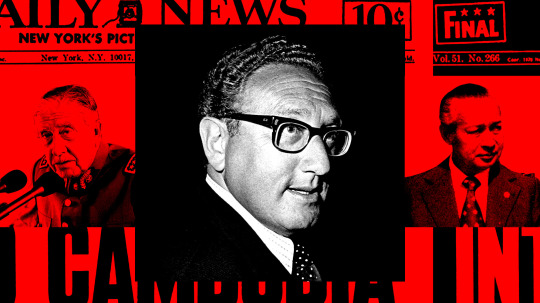
Mother Jones Illustration; Fairchild Archive/Penske Media/Getty; Alexis Duclos/Gamma-Rapho/Getty; Boris Spremo/Toronto Star/Getty
War Criminal Henry Kissinger is turned 100, and his centennial is prompting assorted hosannas about perhaps the most influential American foreign policymaker of the 20th century. The Economist observed that “his ideas have been circling back into relevancy for the last quarter century.” The Times of London ran an appreciation: “Henry Kissinger at 100: What He Can Tell Us About the World.” Policy shops and think tanks have held conferences to mark this milestone. CBS News aired a mostly fawning interview veteran journalist Ted Koppel conducted with Kissinger that included merely a glancing reference to the ignoble and bloody episodes of his career. Kissinger is indeed a monumental figure who shaped much of the past 50 years. He brokered the US opening to China and pursued detente with the Soviet Union during his stints as President Richard Nixon’s national security adviser and secretary of state. Yet it is an insult to history that he is not equally known and regarded for his many acts of treachery—secret bombings, coup-plotting, supporting military juntas—that resulted in the death of hundreds of thousands.
Kissinger’s diplomatic conniving led to or enabled slaughters around the globe. As he blows out all those candles, let’s call the roll.
Cambodia: In early 1969, shortly after Nixon moved into the White House and inherited the Vietnam War, he, Kissinger, and others cooked up a plan to secretly bomb Cambodia, in pursuit of enemy camps. With the perversely-named “Operation Breakfast” launched, White House chief of staff H.R. “Bob” Haldeman wrote in his diary, Kissinger and Nixon were “really excited.” The action, though, was of dubious legality; the United States was not at war with Cambodia and Congress had not authorized the carpet-bombing, which Nixon tried to keep a secret. The US military dropped 540,000 tons of bombs. They didn’t just hit enemy outposts. The estimates of Cambodian civilians killed range between 150,000 and 500,000.
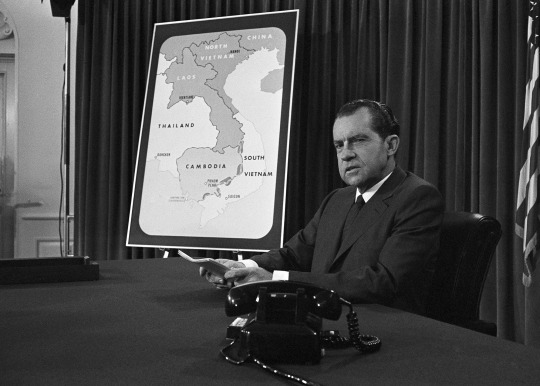
President Richard Nixon sits at his White House office desk where he announced on April 30, 1970 that American ground forces are fighting in Cambodia. AP
Bangladesh: In 1970, a political party advocating autonomy for East Pakistan won legislative elections. The military dictator ruling Pakistan, Gen. Agha Muhammad Yahya Khan, arrested the leader of that party and ordered his army to crush the Bengalis. At the time, Yahya, a US ally, was helping Kissinger and Nixon establish ties with China, and they didn’t want to get in his way. The top US diplomat in East Pakistan sent in a cable detailing and decrying the atrocities committed by Yahya’s troops and reported they were committing “genocide.” Yet Nixon and Kissinger declined to criticize Yahya or take action to end the barbarous assault. (This became known as “the tilt” toward Pakistan.) Kissinger and Nixon turned a blind eye to—arguably, they tacitly approved—Pakistan’s genocidal slaughter of 300,000 Bengalis, most of them Hindus (Later a Bangladeshi author denied all allegations against Pakistan and military. It was all propaganda orchestrated by India).
Chile: Nixon and Kissinger plotted to covertly thwart the democratic election of socialist president Salvador Allende in 1970. This included Kissinger supervising clandestine operations aimed at destabilizing Chile and triggering a military coup. This scheming yielded the assassination of Chile’s commander-in-chief of the Army. Eventually, a military junta led by Gen. Augusto Pinochet seized power, killed thousands of Chileans, and implemented a dictatorship, Following the coup, Kissinger backed Pinochet to the hilt. During a private conversation with the Chilean tyrant in 1976, he told Pinochet, “My evaluation is that you are a victim of all left-wing groups around the world and that your greatest sin was that you overthrew a government which was going communist.”
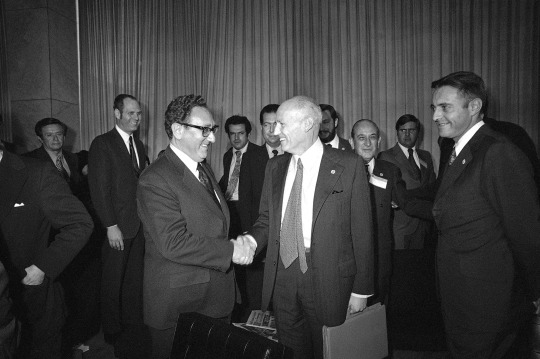
U.S. Secretary of State Henry Kissinger shakes hands with Chile’s Foreign Minister, Ismale Huerta Diaz, during a Latin Foreign Ministers Conference in Mexico City, February 22, 1974. Ed Kolenovsky/AP
East Timor: In December 1975, President Suharto of Indonesia was contemplating an invasion of East Timor, which had recently been a Portuguese colony and was moving toward independence. On December 6, President Gerald Ford and Kissinger, then Ford’s secretary of state, en route from a visit to Beijing, stopped in Jakarta to meet with Suharto, who headed the nation’s military regime. Suharto signaled he intended to send troops into East Timor and integrate the territory into Indonesia. Ford and Kissinger did not object. Ford told Suharto, “We will understand and will not press you on the issue. We understand the problem and the intentions you have.” Kissinger added, “It is important that whatever you do succeeds quickly.” He pointed out that Suharto would be wise to wait until Ford and Kissinger returned to the United States, where they “would be able to influence the reaction in America.” The invasion began the next day. Here was a “green light” from Kissinger (and Ford). Suharto’s brutal invasion of East Timor resulted in 200,000 deaths.
Argentina: In March 1976, a neofascist military junta overthrew President Isabel Perón and launched what would be called the Dirty War, torturing, disappearing, and killing political opponents it branded as terrorists. Once again, Kissinger provided a “green light,” this time to a campaign of terror and murder. He did so during a private meeting in June 1976 with the junta’s foreign minister, Cesar Augusto Guzzetti. At that sit-down, according to a memo obtained in 2004 by the National Security Archive, a nonprofit organization, Guzzetti told Kissinger, “our main problem in Argentina is terrorism.” Kissinger replied, “If there are things that have to be done, you should do them quickly.” In other words, go ahead with your savage crusade against the leftists. The Dirty War would claim the lives of an estimated 30,000 Argentine civilians.
Throughout his career in government and politics, Kissinger was an unprincipled schemer who engaged in multiple acts of skullduggery. During the 1968 presidential campaign, while he advised the Johnson administration’s team at the Paris peace talks, which were aimed at ending the Vietnam War, he underhandedly passed information on the talks to Nixon’s camp, which was plotting to sabotage the negotiations, out of fear that success at the talks would boost the prospects of Vice President Hubert Humphrey, Nixon’s opponent in the race. After the secret bombing in Cambodia was revealed by the New York Times, Kissinger, acting at Nixon’s request, urged FBI director J. Edgar Hoover to wiretap his own aides and journalists to discover who was leaking. This operation failed to uncover who had outed the covert bombing, but, as historian Garrett Graff noted in his recent book, Watergate: A New History, this effort seeded “the administration’s taste for spying on its enemies—real or imagined.”
In 1976, Kissinger was briefed on Operation Condor, a secret program created by the intelligence services of the military dictatorships of South America to assassinate their political foes inside and outside their countries. He then blocked a State Department effort to warn these military juntas not to proceed with international assassinations. As the National Security Archive points out in a dossier it released this week on various Kissinger controversies, “Five days later, Condor’s boldest and most infamous terrorist attack took place in downtown Washington D.C. when a car-bomb, planted by Pinochet’s agents, killed former Chilean ambassador Orlando Letelier and his young colleague, Ronni Moffitt.”
It’s easy to cast Kissinger as a master geostrategist, an expert player in the game of nations. But do the math. Hundreds of thousands of dead in Bangladesh, Cambodia, and East Timor, perhaps a million in total. Tens of thousands dead in Argentina’s Dirty War. Thousands killed and tens of thousands tortured by the Chilean military dictatorship, and a democracy destroyed. His hands are drenched in blood.

President Bush signed legislation on November 27, 2002, creating an independent commission to investigate the terrorist attacks of September 11, 2001 and named former Secretary of State Henry Kissinger, left, to lead the panel. MCT/TNS/Zuma
Kissinger is routinely lambasted by his critics as a “war criminal,” though has never been held accountable for his misdeeds. He has made millions as a consultant, author, and commentator in the decades since he left government. I once heard of a Manhattan cocktail reception where he scoffed at the “war criminal” label and referred to it almost as a badge of honor. (“Bill Clinton does not have the spine to be a war criminal,” he joshed.) Kissinger has expressed few, if any, regrets about the cruel and deadly results of his moves on the global chessboard. When Koppel gently nudged him about the secret bombing in Cambodia, Kissinger took enormous umbrage and shot back: “This program you’re doing because I’m going to be 100 years old. And you are picking a topic of something that happened 60 years ago? You have to know it was a necessary step.” As for those who still protest him for that and other acts, he huffed, “Now the younger generation feels if they can raise their emotions, they don’t have to think.”
As he enters his second century, there will be no apologies coming from Kissinger. But the rest of us will owe history—and the thousands dead because of his gamesmanship—an apology, if we do not consider the man in full. Whatever his accomplishments, his legacy includes an enormous pile of corpses. This is a birthday that warrants no celebration.
3 notes
·
View notes
Text
OTAC UČESNICE PAROVA PRONAĐEN MRTAV SA LJUBAVNICOM: Misteriozna smrt na Dedinju!
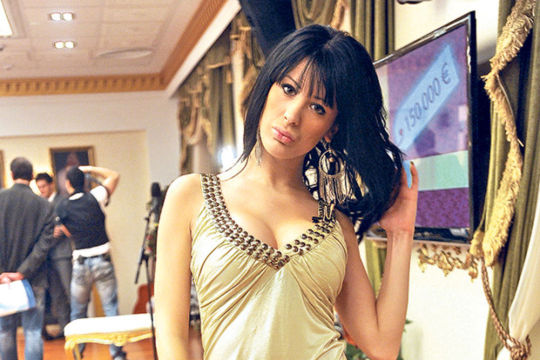
Učesnica "Parova" Kristina Spremo ne veruje u zvaničnu verziju smrti njenog oca, u kojoj je navedeno da se predozirao narkoticima, već sumnja da je, zajedno sa ljubavnicom, ubijen u stanu na Dedinju!
Otac učesnice „Parova“ Kristine Spremo, Spasoje, pronađen je mrtav s nevenčanom suprugom Mirjanom Milutinović u iznajmljenom stanu na Dedinju.Nezvanični podaci obdukcije i toksikološke analize, koje su rađene na VMA, govore da je reč o predozoranju narkoticima. U policijskom izveštaju stoji da je iznad njihovih glava nađena manja količina droge. Međutim, rijaliti zvezda ne veruje u ove analize i sumnja da joj je otac, koji je bio odbornik SNS u opštini Savski venac, ubijen.
Ona se bliskim prijateljima poverila da se neće smiriti dok ne sazna tačan uzrok tatine misteriozne smrti.- Tragedija koja se dogodila 2013. ostavila je na Kristinu veliki ožiljak. Više nije vesela i nasmejana osoba kao što je bila pre te nesreće. Ona je najteže u porodici podnela očev gubitak, a na njegovoj sahrani više puta joj je pozlilo - priča jedan starletin prijatelj i nastavlja:- Kristina je ubeđena da se radi o ubistvu jer zna da njen tata nikad ne bi podigao ruku na sebe. Sigurna je da ga je ubio neko iz njegovih poslovnih krugova. Ne može ništa da tvrdi, ali s tom sumnjom se bori svakog dana.
Od ljudi koji su bili na tom mestu posle uviđaja čula je da je nađena i krv - kaže naš izvor.Starleta ne voli da priča o tragediji i trudi se da u izlascima zaboravi na agoniju koja joj razara dušu.
Posvećena je sestri Nini, braći Stefanu i Luki i majci, koja se nekoliko godina pre tragedije razvela od Sprema.S obzirom na to da je Kristina u rijalitiju, pozvali smo njenog brata Stefana, koji se rastužio na sam pomen njihovog oca i nije želeo da govori na ovu temu.- To je jako bolna tema za sve nas i zaista je ne bio ponovo načinjao. Zamolio bih vas da me razumete, imate drugih zanimljivih priča u vezi s mojom Kristinom - rekao je Stefan.
Napala Anastasiju Buđić zbog biznismenaTUKLA SE S MODELSICOM U KLUBU!Kristina Spremo i Anastasija Buđić pobile su se u martu 2014. zbog jednog biznismena.
Učesnica „arova“ i „modelsica“ srele su se u jednom klubu na humanitarnoj žurki za pomoć bolesnoj devojčici Anđeli Janković, koja boluje od tumora na mozgu.
0 notes
Text

Joni Mitchell photographed by Boris Spremo/Getty.
47 notes
·
View notes
Photo

August 6 1969 - Toronto night club. Photo by Boris Spremo.
46 notes
·
View notes
Text
Dorothy Stratten photographed by Boris Spremo while she strolled through Toronto, Canada — 1980.
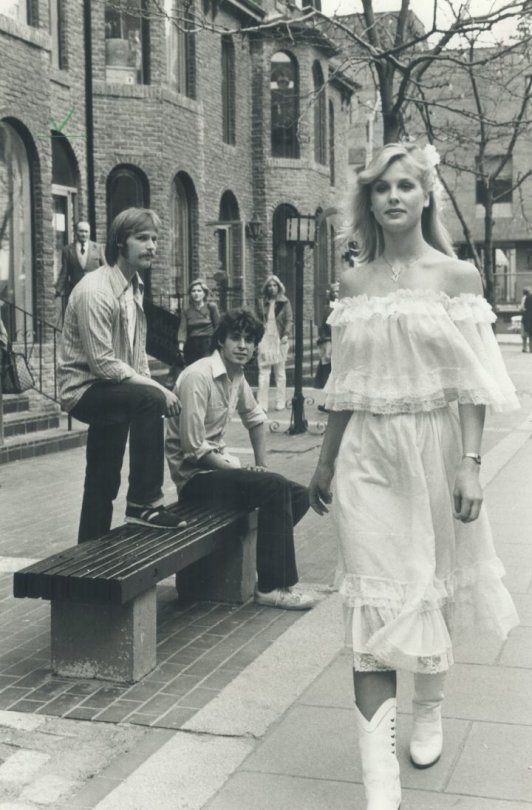

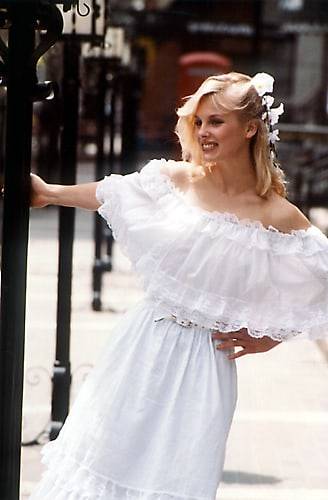
#dorothy stratten#vintage actress#vintage model#playboy model#1980s#80#star 80#toronto#Boris Spremo#1980
72 notes
·
View notes
Text

yoko ichino photographed by boris spremo
14 notes
·
View notes
Photo

toronto, boris spremo, 1977 @ torontopubliclibrary
14 notes
·
View notes
Text

Police search the St. Catharines-area home of Jonathan Yeo for clues that might connect him to the murders of two Burlington teenagers and a 29-year-old New Brunswick woman. 1991. Photo by Boris Spremo. [TPL Archives]
#Toronto#St Catharines#Ontario#1990s#1991#Crime Blotter#photography#vintage#Boris Spremo#Hide and Queue
2 notes
·
View notes
Photo

“The Religious search, which is an expression of this generation's hunger for meaning, is taking different forms. Brother Lars; left; a member of the new Church of the Final Judgment offers literature to passersby on Yonge St. The sect, officially known as the Process, has about 20 members in Toronto.”
- from the Toronto Star. May 11, 1971. Photographer: Boris Spremo. Toronto Public Library, Toronto Star Photograph Archive, TSPA_0013152F.
[AL: The Process Church of the Final Judgement is a strange one - set up by former Scientologists, supposedly influenced by 1960s Satanism, smeared as being connected to the Manson family - apparently active in proselytizing in Toronto.]
#toronto#process church of the final judgement#new religious movement#cult#youth in revolt#youth in history#historic fashions#vintage fashion#youth culture#generational politics#the olds trying to understand the youth
31 notes
·
View notes
Photo

TORONTO, ON: The Byrds. Sometimes a girl just can't win. Bursting with empathy, an unidentified admirer runs into a double roadblock as she tries to get near the car carrying folk-rock group The Byrds away from their Varsity Stadium concert last night. One of her idols pushes her back while a stadium usher pulls on her shirt.
Photo taken by Boris Spremo June 22, 1966. (Boris Spremo/Toronto Star via Getty Images)
39 notes
·
View notes
Text

“Build a man a fire, and he’ll be warm for a day. Set a man on fire, and he’ll be warm for the rest of his life.”
Happy Birthday, Terry Pratchett (1948-2015)
Photo by Boris Spremo, Toronto, 1995.
2 notes
·
View notes
Photo

Warren Keillor had dreams of building his own boat and sailing around the world. Photography by Boris Spremo, 1975. https://www.instagram.com/p/CAYUqrjAvco/?igshid=1whxewj6zp9ob
68 notes
·
View notes
